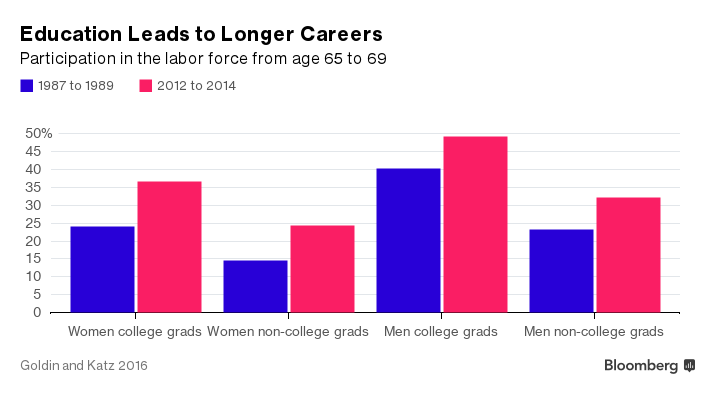More and more older Americans are working longer. Women, new research suggests, are much of the reason why.
Working into your late sixties, even seventies, is hardly as rare as it used to be; just ask Hillary Clinton, 68, or Donald Trump, 70. Today, Americans are more likely to work past 65 than at any point since before Medicare was created in the 1960s—but most are men, whom we're used to seeing work well into old age. (Think Carl Icahn, still moving the market with his activist investing at 80, or Warren Buffett, at 86 heading $360 billion Berkshire Hathaway.)
Now more women are working at ages when their mothers and grandmothers were long retired. Economists and other academics are trying to figure out why, and research suggests the trend will continue and could accelerate.
A prime driver of working in old age is education: Both women and men with college educations are far more likely to be working in their late sixties and seventies than are less-educated Americans, and the number of college graduates is on the rise.
Past work history also matters. The surge of women into the workforce in the 1970s and 1980s means that these women, now older, have job skills, connections, and careers that they can continue to pursue.
As the oldest baby boomers reach their seventies, they're not only working; increasingly they're working full-time. Almost half of women working in their late sixties are in full-time, year-round jobs, up from about 30 percent 20 years ago, Harvard University economics professors Claudia Goldin and Lawrence Katz found in new research.

A major factor in whether women postpone retirement is whether they like their jobs, said Goldin and Katz, who analyzed survey data linked to Social Security earnings records. “As jobs become more enjoyable and less onerous and as various positions become part of one’s identity, women work longer,” they wrote.
Children, on the other hand, aren't much of a factor in whether women work to 65 and beyond, Goldin and Katz found. Having kids does make it tougher for women to stay in the work force full-time from ages 25 to 44—something Goldin and Katz blame partly on the fact that parental leave of longer than 12 weeks isn't mandated—but it doesn’t affect their participation later in life. While these mothers may end up earning less than if they hadn’t had kids, they seem to be restarting interrupted careers once their children are older.
Not all the trends are so cheery.
By the age of 65, women have typically spent less time than men in the workforce—which means less time saving for retirement and qualifying for Social Security benefits. Meanwhile, women in their mid-sixties can expect to live longer than men; a current 65-year-old American man's average life expectancy is 83, while women can expect to live to almost 86, on average.








